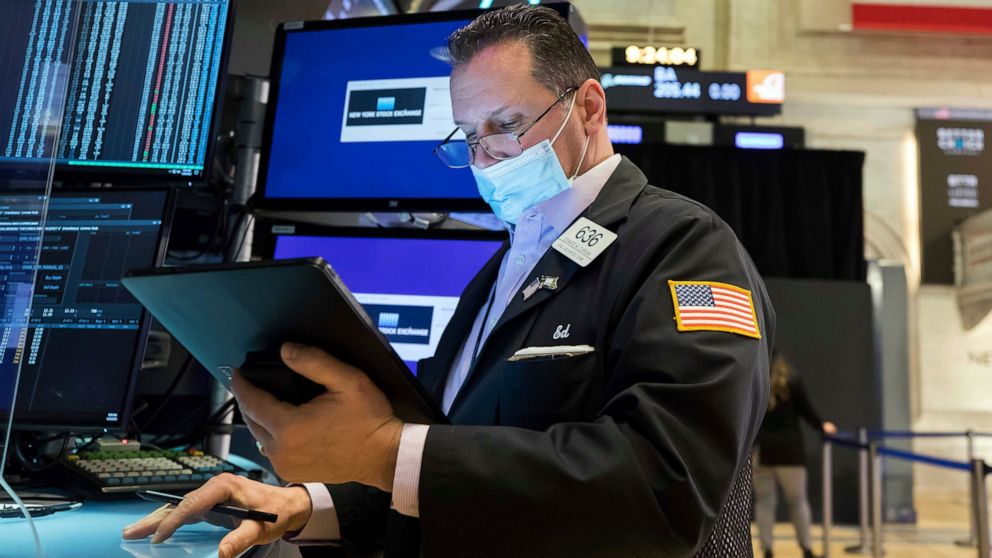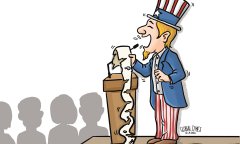Asian shares decline amid omicron, Fed, Ukraine jitters
Asian shares have fallen following a volatile day on Wall Street
January 25, 2022, 3:12 AM
5 min read
Share to FacebookShare to TwitterEmail this article
3:28
Catch up on the developing stories making headlines.
The Associated PressTOKYO -- Asian shares skidded Tuesday following a volatile day on Wall Street. Inflation-fighting measures from the Federal Reserve and the possibility of conflict between Russia and Ukraine are overhanging markets.
Japan's benchmark Nikkei 225 slipped 2.0% in morning trading to 27,027.23. Australia's S&P/ASX 200 dropped 2.3% to 6,972.10. South Korea's Kospi lost 2.1% to 2,734.03. Hong Kong's Hang Seng shed 1.7% to 24,242.91, while the Shanghai Composite dipped 1.0% to 3,487.46.
“The surprise turnaround in U.S. market overnight does not seem to provide any relief into Asia’s session today,” said Yeap Jun Rong, market strategist at IG.
A late-day buying spree pushed the benchmark S&P 500 index to a 0.3% gain after pulling it out of so-called correction territory — a drop of 10% or more from its most recent high. The Dow Jones Industrial Average had declined more than 1,000 points before rallying and ending higher.
“We’re in this wait-and-see mode, which is almost the most uncomfortable place to be, so I think the market is really grappling with that,” said Lindsey Bell, chief markets and money strategist at Ally Invest.
Monday’s wild turnaround followed a three-week decline for the S&P 500, concluding with its worst weekly stretch since the start of the pandemic.
The S&P 500 fell as much as 4% Monday. The index has recovered from an intraday loss that big only three times in the past. The tech-heavy Nasdaq index rose 0.6% after recovering from a nearly 5% descent.
Early in the day, benchmark stock indexes flirted with near 4-month lows as investors anticipated guidance from the Fed later this week about its plans to raise interest rates to tame inflation, which is at its highest level in nearly four decades.
The Fed’s short-term rate has been pegged near zero since the pandemic hit the global economy in 2020 and that has fueled borrowing and spending by consumers and businesses.
But rising prices at supermarkets, car lots and gas stations are raising concerns that consumers will pare back spending to limit the pressure on their budgets. Companies have warned that supply-chain problems and higher raw materials costs could crimp their profits.
The Fed has kept downward pressure on longer-term interest rates by buying trillions of dollars worth of government and corporate bonds, but those emergency purchases are scheduled to end in March. Nudging rates higher is intended to help slow economic growth and the rate of inflation.
“There’s a short-term panic and part of that is the high level of uncertainty around what the Fed is going to do," said Sylvia Jablonski, chief investment officer at Defiance ETFs.
Investors are also keeping an eye on developments in Ukraine. Tensions soared Monday between Russia and the West over concerns that Moscow is planning to invade Ukraine, with NATO outlining potential troop and ship deployments.
The S&P 500 rose 12.19 points to 4,410.13. It’s now 8.1% below the all-time high it set on Jan. 3.
The Dow rose 99.13 points to 34,364.50. The Nasdaq gained 86.21 points to 13,855.13.
Small company stocks also bounced back. The Russell 2000 rose 45.59 points, or 2.3%, to 2,033.51. The index had been down 2.8%.
The wave of selling also extended to cryptocurrencies. Bitcoin fell as low as $33,000 overnight but rallied back above $36,000 by late afternoon. Still, the digital currency is far below the high of more than $68,000 it hit in November.
Retailers notched some of the biggest gains in the comeback: Gap jumped nearly 8%.
The market is waiting to hear from chair Jerome Powell Wednesday after Fed policymakers conclude a two-day meeting and offer their latest thinking on the economy and interest rates.
Some economists worry the Fed is moving too slowly. Others fret that the Fed may act too aggressively. They argue that numerous rate hikes would risk causing a recession and wouldn’t slow inflation in any case. In this view, high prices mostly reflect snarled supply chains that the Fed’s rate hikes are powerless to cure.
When the Fed boosts its short-term rate, it tends to make borrowing more expensive for consumers and businesses, slowing the economy with the intent of reducing inflation. That could reduce company earnings, which tend to dictate stock prices over the long term.








